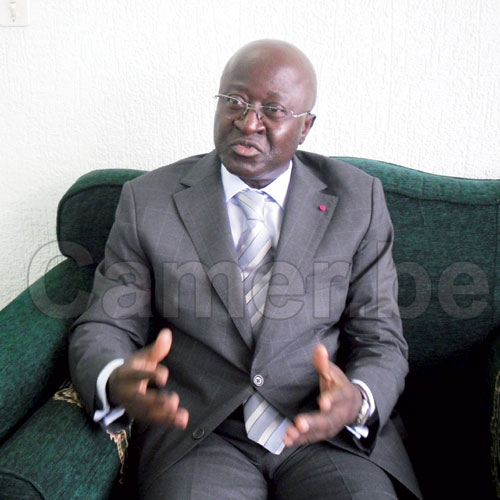 REPUBLIC OF CAMEROON PEACE - WORK - FATHERLAND LAW N° 98 / 014 OF 14 JUIL. l998 TO GOVERN TELECOMMUNICATIONS IN CAMERROON The National Assembly deliberated and adopted, The President of the Republic hereby enacts the law set out below: PART I GENERAL PROVISIONS Section 1: This law shall
REPUBLIC OF CAMEROON PEACE - WORK - FATHERLAND LAW N° 98 / 014 OF 14 JUIL. l998 TO GOVERN TELECOMMUNICATIONS IN CAMERROON The National Assembly deliberated and adopted, The President of the Republic hereby enacts the law set out below: PART I GENERAL PROVISIONS Section 1: This law shall
govern telecommunications in Cameroon. To this end, it shall: - lay down the conditions for the installation, exploitation and balanced development of telecommunications; - encourage and facilitate private sector involvement in telecommunications development within a competitive environment; - aim at enhancing the harmonious development of telecommunications networks and services with a view to ensuring the contribution of this sector to national economic development and satisfying the numerous needs of users and the population. Section 2: (1) This law shall apply all over the territory of Cameroon to the various telecommunications services, provided by any telecommunications enterprise regardless of its lega1 status, the location of its head office or main establishment and the nationality of the owners of its capital or that of its managers. (2) The following shall be excluded from the scope of application of this law: - radio and television broadcasting enterprises in respect of all their production and programming activities as well as authorizations to use radio and television broadcasting frequencies; - State installations set up for the purpose of national defence or public security, or using frequency bands directly assigned to a government service for the exclusive satisfaction of its specific needs, in accordance win the recommendations with prescriptions of the International Telecommunications Union. Section 3: For the implementation of this law and the statutory instruments resulting therefrom, the following definitions shall apply: 1. Administration in charge of telecommunications: The Ministry or Minister, as the case may be, vested with general authority over the telecommunications sector, on behalf of the Government. 2. Board: an autonomous government body responsible for regulating, controlling and monitoring telecommunications activities. 3. Allocation of a frequency or a radiofrequency channel: an authorization granted to a radiofrequency station for the use of a frequency or a radiofrequency channel, determined under specified conditions. 4. Frequency band allegation: registration in the frequency band allocation register of a specific frequency band for the use of one or more services. 5. Submarine cable: any physical medium for telecommunications signals which uses the marine environment as a passageway for cables. Such a medium shall be termed international when it links two or more countries. 6. Terminal: any appliance, installation or set of installations destined for connection to a terminal point of a network and which emits, receives or processes telecommunications signals. This shall
not include equipment which gives access to audiovisual communication services transmitted by radio waves or by cable, save when such equipment also makes it possible to access telecommunciations services. 7. Basic requirements: requirements necessary to guarantee, in the general interest: - the safety of users and of personnel operating telecommunications networks; - the protection of networks and, in particular, the exchange of control and management information related thereto, - the proper use of the radio spectrum, if need be; - interoperability between the services and terminals, as well as the protection of data. 8. Management of the radio frequency spectrum: all the administrative and technical actions aimed at ensuring rational utilization of the radio frequency spectrum by users. 9. Homologation: a process which makes it possible to evaluate the conformity of GMPCS or other terminals to statutory technical prescription. Such prescriptions mainly aim at ensuring that GMPCS and other terminals are not detrimental to the networks, GMPCS users, other users or other equipment. 10. Interconnection: reciprocal services provided by two telecommunications operators through networks open to the public that enable all users to communicate freely with each other, regardless of the networks to which they are connected or the services they use. 11. Interoperability between terminals: the capacity of terminals to function with the network, on the one hand and with other terminals which give access to the same services on the other. 12. Radio installation, station or equipment: any telecommunications installation, station or equipment which uses radio frequencies for the propagation of waves in free space. Radio installations shall, in particular, include networks using satellite capacity. 13. Licensing: the issue of a licence or any other permit in accordance with the laws and regulations in force and with the provisions of the radiocommunications regulations of the International Telecommunications Union. 14. Operator: any individual or corporate body operating a telecommunications network open to the public or providing a telecommunications service to the public. 15. Interministerial frequency management body: an interministerial committee responsible for allocating radio frequency bands. 16. Terminal points: physical connection points which conform to the technical specifications necessary to gain access to and communicate efficiently through a telecommunications network it. They are an integral part of the network. When a telecommunications network is connected to a foreign network, the points of connection to the latter are considered terminal points. When a telecommunications network is destined for the transmission of signals to radiobroadcasting installations, the points of connection to such installations shall be considered terminal points. 17. Cryptology services: any service which, with secret codes, is intended to transform information or clear signals into information or signals which are unintelligible to third parties, or the reverse, using means, equipment or software designed for that purpose. 18. Radiocommunication: any telecommunication carried out using electromagnetic waves of a frequency below 300 gigahertz, broadcast in space without any artificial guide. 19. Radiobroadcasting: any radiocommunication whose broadcasts are destined for direct reception by the public. 20. Private network: a telecommunications network reserved for private use or shared by a closed group of users. The private network shall be "independent" when it spans several estates, sites or private property, and therefore the public property of the State, including hertzian
property, and/or sites or private property of third parties. The private network shall be "internal" when it is completely established over a single estate, a single site or a single private property, without encroaching on the public property of the State, including radio waves, or on the property of third parties. 21. Public network: all telecommunications networks set up or used for the benefit of the public. 22. Telecommunications network: any installation or set of installations for transmitting or channelling telecommunications signals, or for the exchange of command and management information associated with such signals, between the terminal points of the network. 23. Value-added service: any additional service to basic telecommunications services. Some of these value-added services are said to be "telematic" when in most cases, they combine the simple transmission of data with the processing of the transported data. 24. Data transmission service: a service for the mere transmission of data without any additional processing. 25. Basic telecommunications services: international, national and local telecommunications services for telephone communication between fixed points, facsimile, telex and telegraph. 26. Telecommunications service: any service involving the signals transmission or conduction, or a combination of the two, using telecommunication means, excluding audiovisual communication, sound broadcasting and television broadcasting services, provided using hertzian frequencies or distributed by cable. 27. Telex service: the use, for commercial purposes, of the direct transfer of type-written messages through an exchange of telegraphic signals between users at the terminal points of a telecommunications network. 28. Universal service: a basic telecommunications service provided all over the national territory under defined conditions and in accordance with modalities provided for by this law and the legal and statutory instruments in force to guarantee the basic requirements. 29. GMPCS (Global Mobile Personal Communication System) system: any satellite system which is fixed or mobile, uses a wide or narrow band, is global or regional, geoestationary or non-geoestationary, existing or projected, that provides telecommunications services directly or indirectly to end-users from a constellation of satellites. 30. Telecommunication: any transmission, emission or reception of signs, signals, script, images, sound or any other information by wire, optic fibre, radiofrequency or any other electromagnetic system. 31. Television broadcasting: transmission or retransmission of radiobradcast signals received by satellite or by an appropriate ground system, or produced locally, to subscribers through a cable or radio network. Section 4: Persons authorized to set up a network open to the public and providers of telecommunications services, as well as members of their personnel shall be bound to keep secret the content of users' messages. Section 5: (1) Actions and practices which aim to, or may-prevent, restrict or compromise competition in the telecommunications market shall be prohibited, especially when they tend to: - limit access to the market or free competition from other enterprises; - obstruct price fixing through the free intervention of market forces by artificially hiking or lowering them; - limit or control production investments or technological progress; - cut off markets or supply sources or create regional monopolies. (2) An enterprise or group of enterprises shall also be prohibited from making abusive use of: - a dominant position on the local market or a good portion thereof; - a situation where a client or supplier without an equivalent solution is economically dependent on
him. Such abuses may consist, in particular, of unjustified discriminatory refusal of access to telecommunications networks open to the public or to the supply of telecommunications services, as well as unjustified or discriminatory discontinuance of established commercial relations. (3) The following practices shall not be subject to the provisions of 5(1) and (2) above; - practices resulting from the implementation of a legislative or statutory instrument: - practices which the authors can prove are intended to ensure economic advancement and whose users are allocated a fair share of the profits accruing therefrom, provided that the said practices do not entail elimination of competition for a substantial portion of the products and services concerned. Section 6: Any undertaking, agreement or contractual provision relating to a practice prohibited under section 5 above shall be null and void. PART II LEGAL REGIME OF TELECOMMUNICATIONS NETWORKS AND SERVICES Section 7: Telecommunications networks and services shall be governed by one of the following regimes: - concession; - authorization; - declaration. CHAPTER I CONCESSION Section 8: The following shall fall under the exclusive rights of the State: (a) laws and regulations governing telecommunications; (b) management of the radio frequency spectrum. These exclusive rights may not be transferred through concessions. Section 9: (1) The following rights of the State may be transferred in whole or in part to one or more bodies corporate governed by public or private law through conventions which shall lay down, in particular, the rights and obligations of the concessionaire and the transferring authority: establishment of public telecommunications networks; supply of telephone services between fixed points; supply of telex and telegraph services; establishment of infrastructure for the transmission of sound broadcasting signals; global mobile personal communication systems (GMPCS); transmission and/or reception only of radiofrequency waves from or to a telecommunications satellite. (2) The concession referred to in Section 9 (2) shall be subject to compliance by the prescriptions indicated in a schedule of conditions appended to the convention and relating to:
the nature, characteristics and the zone of coverage of the service; the conditions of continuous, good quality and available service; the conditions of confidentiality and neutrality of the service with respect to the messages transmitted; network and service standards and specifications; the use of the frequencies assigned; the required prescriptions with respect to national defence and public security; the royalties payable for use of the radiofrequency spectrum and contributions for management and control expenses; the operator’s contribution to research, training and standardization in the field of telecommunications and to universal services; the interconnection conditions and, as where applicable, the principle of payment of access charges for a non-radiofrequency network open to the public; the conditions for commercial operation required to ensure fair competition and equal treatment of users; the duration, conditions for terminating and renewing the concession; the obligations of the holder vis-à vis universal services; the modalities of calculation and revision of the fees payable as contribution to the development of telecommunications throughout the national territory. (3) Whatever the case, the specifications provided for in Section 9 (2) shall be given the widest possible publicity. (4) The concession agreement and schedule of conditions negotiated and instituted in accordance with the laws and regulations in force shall be approved by decree of the President of the Republic. CHAPTER II AUTHORIZATION Section 10: The operation of a network for the purpose of supplying telecommunications services to the public shall be subject to authorization granted according to the terms laid down by regulations. Such authorization shall lay down the conditions for operating networks as well as for supplying telecommunications services in accordance with the schedule of conditions provided under Section 9(2) of this law. The authorization shall entail the granting of a licence by the competent authority under conditions laid down by a decree to implement this law. Section 11: (1) Natural persons or bodies corporate may, under conditions laid down by regulations, be authorized to operate: terminal equipment giving the public access, against payment, to the services referred to in Section 9(1)(b) and (c) of this law; value-added services; any support service. (2) An authorization shall be subject to respect of the specifications relating to: the nature, characteristics and zone of coverage of the service; the conditions of permanency, availability, quality and neutrality of the services; respect of the technical prescriptions concerning access to the service, its interconnection with
other support services and operating compatibility therewith; the required prescriptions for national defence and public security; the operating conditions required to protect exclusive supply of the services referred to in Section 9(1) by holders of concession agreements and to ensure fair competiion; the duration, conditions for termination and renewal of the authorization; the universal service obligation of the holder as provided for in Section 18 of this law; the modalities for calculation and revision of the fees payable as contribution to the development of telecommunications throughout the national territory. Section 12: Supply of telecommunications services other than those referred to under Section 9(1) above and using radio frequencies shall be subject to prior authorization under the following conditions: (a) where the supply of the service entails the operation of a new radio frequency network or modification of an authorization already granted to operate a network, the provisions of Section 5 of this law shall apply; (b) where the service is supplied through a radio frequency network using frequencies assigned to a person referred to in Section 2(1) above, the authorization shall be subject to respect of the prescriptions in the specifications and concerning all or some of the points under Section 9(2) of this law. CHAPTER III DECLARATION Section 13: (1) The following may, subject to the provisions of Section 5 above, be established upon mere declaration against receipt: private internal networks; private independent networks, other than radio frequency networks, whose terminal points are less than 300 metres apart and whose links have a capacity of less than 2 megabytes per second; radio frequency installations that comprise exclusively low-power and short-range apparatus whose categories shall be determined by the Administration in charge of telecommunications. (2) The technical conditions for operating the networks and installations referred to in (b) and (c) of sub-section 13(1) above shall be determined by the Administration in charge of telecommunications. Section 14: Supply of telecommunications services other than those referred to in Sections 9, 10 and 11 shall be free, subject to fulfillment of the basic requirements defined in Section 3(7). However, such services shall be subject to authorization where they use link capacities hired from holders of the concession agreements provided for under Section 9(1). Section 15: (1) Where the overall access capacity of the links hired is less than 2 megabytes per second, a prior declaration shall suffice. Otherwise, the supply of telecommunications services must be subject to a prior authorization issued by the competent authority. (2) The declaration and the authorization provided for in Subsection (1) above are intended to: - ensure that the service provided does not, on account of the provision of additional services and especially the data processing involved therein, constitute a support service subject to the authorization under the conditions as provided under Section 11 of this law; - ascertain that such service fulfills the basic requirements.
CHAPTER IV PROVISIONS COMMON TO THE DECLARATION AND AUTHORTZAT10N SCHEMES Section 16: (1) The authorization and declaration receipts issued pursuant to the foregoing chapters shall be personal and nontransferable. They shall be published in a journal of legal notices along with the specifications attached thereto, if necessary. (2) Where the holder of an authorization or a declaration receipt issued pursuant to this law fails to fulfil the obligations imposed on him by the legal and statutory instruments, he may be served with notification to comply thereto. (3) Where the holder fails to comply with the notice addressed to him, he shall be liable to one of the penalties provided for in Section 41 of this law. Section 17: (1) The Administration in charge of telecommunications may annul the authorization or declaration and pronounce the disqualification of its holder in the event of a decision for dissolution, legal liquidation or bankruptcy. The said decision may or may not be accompanied by the authorization to continue the enterprise. (2) The holder of an authorization or of the declaration receipt shall be bound to inform the Board of any changes occurring in the allotment of the registered capital or in the management of the enterprise. (3) Where the changes mentioned in Subsection (2) above are deemed to be contrary to public interest, the Board may propose that the authorization or the declaration be annulled. CHAPTER V THE UNIVERSAL SERVICE OBLIGATION Section 18: (1) The universal service obligation in telecommunications shall consist in the provision of basic telecommunications services. (1) This obligation shall also entail; - routing telephone communications originating from, or destined for subscription points; - routing emergency calls free of charge; - providing an information service and a directory of subscribers; Section 19: The obligations and conditions for providing universal telecommunications services shall be laid down by the specifications. Section 20: The financing of the costs for rendering of a universal service obligation shall be borne by all the operators of public networks and suppliers of public telephone services, under the conditions laid down in the concession agreements and in the specifications. PART III REGULATION, CONTROL AND SETTLEMENT OF TELECOMMUNICATIONS DISPUTES
CHAPTER I TELECOMMUNICATIONS REGULATION AND CONTROL BODIES Section 21: (1) The Administration in charge of telecommunications shall be responsible for the formulation and implementation of a sectorial telecommunications policy, taking into account the technological advances in the telecommunications sector, the development needs and the Government priorities in the area of telecommunications. Such policy shall be essentially geared towards coping with the gradual changes in the market structure, especially by providing for an adequate number of operators in each sector of the market. The Administration in charge of telecommunications shall also ensure the implementation of this policy and compliance with the regulations relating thereto. (2) The Administration in charge of telecommunications shall, in addition, be responsible for: - supervising the telecommunications sector; - supervising public telecommunications enterprises; - representing the State in international organizations and events concerning telecommunications; - formally issuing to operators and other service providers, after approval by the Regulating Board, authorizations, as well as declarations and approval receipts for networks open to the public and vocal telephony services; Section 22: (1) A Telecommunications Regulating Board, hereunder referred to as "The Board '', is hereby set up by this law. (2) The Board provided for in Subsection (1) above shall be responsible for regulating, controlling and following up the activities of businesses and operators involved in the telecommunications sector. It shall also ensure compliance with the principle of equality in the treatment of users in all telecommunications enterprises. The Board shall, in particular: - ensure the implementation of legal and statutory instruments governing telecommunications; - ensure that access to the networks open to the public takes place under objective, transparent and non-discriminatory conditions; - guarantee sound and fair competition in the sector; - define the principles that should govern the fixing of rates for the services provided; - examine applications for authorizations and declarations and prepare decisions relating thereto; - prepare files and publish invitations to tender for concessions in accordance with the laws and regulations in force; - define the conditions and obligations relating to the interconnection and sharing of infrastructure; - manage the spectrum of frequencies allocated to the telecommunications sector, notably the assignment and control of the frequencies of the said sector; - draw up and manage the numbering plan; - submit to the Government all proposals and recommendations for the development and modernization of the telecommunications sector; - examine files for the homologation of terminal equipment and prepare decisions relating thereto; - discharge any other tasks of general interest which the Government may entrust to it on behalf of the State in the telecommunications sector; - give its opinion on draft instruments of a legislative or statutory nature in the area of
telecommunications. (3) The Board shall arbitrate in the event of disputes between operators concerning in particular, the interconnection or the access to a telecommunications network, numbering, frequency disturbance and the sharing of infrastructure. Section 23: (1) A special telecommunications fund is hereby set up within the Board by this law, in order to: - finance the telecommunications universal service as provided for in Section 18 of this law; - contribute to the financing of telecommunications development through out the national territory. (2) The fund’s resources shall be managed by the Board. (3) Sums due for universal service and for telecommunications development shall be placed in 2 (two) separate accounts. (4) Resources due as contribution to the financing of telecommunications development shall be derived mainly from annual contributions paid by operators and providers of telecommunications services under conditions defined in their respective specifications. These resources shall be used solely for the development of telecommunications according to Government-defined priorities. (5) A decree of the President of the Republic shall define the organization and functioning of the Board as well as the conditions under which the special fund provided for in Section 23 (1) shall be managed. CHAPTER II MANAGEMENT OF THE FREQUENCY SPECTRUM Section 24: (1) The Administration in charge of telecommunications shall ensure the management of the frequency spectrum on behalf of the State. (2) The allocation of radiocommunications frequency bands shall be entrusted to an interministerial body under the Administration in charge of telecommunications. (3) The organization and functioning of the inter-ministerial body mentioned in Subsection 2 above shall be defined by decree of the President of the Republic. Section 25: The inter-ministerial body provided for in Section 24 above shall authorize, in accordance with this law and in compliance with the international agreements in force, the use of frequency bands reserved or set aside for radiocommunications purposes. Section 26: In the event of jamming caused by radio frequency transmission or reception stations, the interministerial body may prescribe any technical measure to correct the situation. CHAPTER III INTERCONNECTION AND ACCESS TO THE NETWORK Section 27: (1) Operators of public networks shall grant, under conditions that are objective, transparent and non-discriminatory, all interconnection requests made by any operator of a public telecommunications service. (2) The interconnection request shall be in writing. The operator to whom the request is addressed shall be bound to reply within a deadline of not more than 60 (sixty) days with effect from the date
of submission of such request. (3) The cost of interconnection shall be borne by the applicant. (4) Operators of public telecommunications services shall be bound to publish, under the conditions provided for in their specifications, a technical interconnection price list approved by the Board. (5) Interconnection shall be subject to an agreement between the two parties who, in compliance with the provisions of this law and its instruments of implementation, shall determine the technical and financial conditions therefor. The said agreement shall be subject to approval by the Board which may at any time request its amendment, where the Board feels that the conditions for competition or interoperability of telecommunications services are not guaranteed. It shall be published in a journal of legal notices on the Board’s initiative. Section 28: (1) The request for interconnection may not be refused if it is reasonable considering the needs of the requesting party and the operator’s ability to meet such needs. Refusal to interconnect must be accompanied by the reasons therefor. (2) The cost of interconnection shall be borne by the applicant. (3) In the event of disagreement between the two parties, the Board shall arbitrate in order to find a solution. CHAPTER IV SHARING OF INFRASTRUCTURE Section 29: Infrastructures of the public telecommunications network, established on State property, may be used for the development and operation of public networks and for providing any telecommunications service to the public. Section 30: (1) The sharing of infrastructure shall be subject to an agreement between the two parties concerned who shall determine its, technical and financial conditions, in accordance with the provisions of this law and its instruments of implementation. Such agreement shall be subject to approval by the Board, which may call for amendment thereof, whenever it deems that the conditions of interoperability of the networks and services are not guaranteed. It shall be published in the journal of legal notices upon the initiative of the Board. (2) The application to share infrastructure shall be in writing. The operator managing the infrastructure concerned shall be bound to reply thereto within a period of not more that 60 (sixty) days with effect from the date of receipt of the application. (3) The application to share infrastructure may not be rejected, where it causes no disruption or any other technical difficulty with regard to the proper establishment of the network and smooth operation of the service. The rejection of an application to share infrastructure shall give reasons therefor. (4) The cost of providing the infrastructure shall be borne by the applicant. (5) In the event of disagreement between the two parties, the Board shall arbitrate in order to find a solution. CHAPTER V
NUMBERING Section 31: The Board shall establish and manage the numbering plan. It shall ensure equal and simple access by users to the different telecommunications networks and services, as well as the equivalence of numbering schemes. Section 32: (1) The Board shall assign prefixes and numbers or sets of numbers to operators in a transparent, objective and non-discriminatory manner. (2) The conditions for use of such prefixes, numbers or sets of numbers provided for in Subsection 1 above shall be specified, as the case may be, by the specifications of the operator or by the assignment decision notified him. CHAPTER VI PUBLICATION OF THE LISTS OF SUBSCRIBERS AND FOREIGN INSTITUTIONS Section 33: The lists of subscribers or users declared by operators of public telecommunications networks shall be published freely, subject to the declaration thereof to the service in charge of telecommunications. Section 34: Foreign institutions and bodies governed by international law shall carry out their telecommunications activities in the national territory in accordance with the agreements signed and ratified by the Republic of Cameroon. Such activities shall, in accordance with this law, be subject to authorization except otherwise stipulated by the aforementioned agreements. CHAPTER VII TERMINAL EQUIPMENT Section 35: (1) The marketing of terminal equipment shall be free. However, where such equipment is meant to be connected to a public network, it shall be subject to homologation under the conditions provided by this law. (2) In any case, homologation shall be required for radio frequency installations, whether or not they are intended for connection to a public network. (3) The purpose of the homologation referred to in Section 35 (1) and (2) above shall be to ensure compliance with the essential requirements defined in Section 3(7), and to verify the conformity of terminal equipment and radio frequency installations with the technical norms and specifications in force in Cameroon, as well as their interoperability. (4) The procedure for homologation of radiofrequency installations intended for connection to the networks referred to in Section 9(1) shall be laid down by an instrument of the Administration in charge of telecommunications. CHAPTER VIII CRYPTOLOGY SERVICES Section 36: (1) The supply, export, import or use of cryptology equipment or services in the
transmission of information shall be subject to: - a prior declaration where such equipment or service is aimed solely at authenticating a communication or ensuring the integrity of the message that is transmitted; - prior authorization in the other cases. An implementation decree shall lay down the conditions for the declaration and the issue of the authorization mentioned in the preceding paragraph. (2) However, the conditions listed in Section 36(1) above shall not be applicable to the cryptography function integrated in sector applications software used by users. CHAPTER IX SETTLEMENT OF DISPUTES AND CONTROL Section 37: (1) The Board shall be competent to examine disputes between telecommunications operators. It shall give a ruling within a period of one month after the matter has been referred to it. (2) Where the Board's ruling is contested by one of the parties, the Board shall immediately designate one or mare arbitrators, inform the parties in conflict and give them a time-limit within which to plead their cases. (3) However, the provisions of Section 37(2) not with standing, each party shall reserve the right to refer the matter to the competent legal authority in accordance with the procedure and time-limit provided for in the instruments in force. (4) The appeal shall not stay execution. However, a stay of execution may be ordered by the court of appeal after a representative of the Board has been heard. (5) The arbitrator shall give a ruling within a period of 1 (one) month during which he shall be bound to hear both parties. His decision shall state in particular, the underlying technical and financial reasons. (6) The decision of the arbitrator shall be binding on the parties who must comply therewith within a time-limit of not more than 30 (thirty) days with effect from the notification of the decision to the Board. Section 38: The arbitrator shall freely follow on the procedure, guided solely by the principles of impartiality, equity and justice. He shall, in agreement with the parties, fix the place of arbitration and may at any time call on either party to submit any further information deemed necessary. Section 39: The Board may, as of right or at the request of the administration in charge of telecommunications, a professional organization, an approved association of users or a natural person or corporate body concerned, after observation or verification, penalize any default by network operators or suppliers of telecommunications services, in accordance with the provisions of the laws and regulations relating to their activity or with decisions taken to ensure implementation thereof. Section 40: (1) Without prejudice to the prerogatives of the Legal Department and judicial police officers with general competence, sworn agents, specially recruited by the Board, shall be in charge of investigation, findings and proceedings to check offences committed in the area of telecommunications. They shall take on oath before the competent court at the request of the Board, under conditions laid down by decree. (2) In the discharge of their duties, the sworn agents may: - carry out unannounced controls and record telecommunications offences in a report; - under the supervision of the State Counsel, carry out searches as well as seize equipment having been used to commit offences and close the premises in accordance with the law.
They shall, upon request, benefit from the assistance of the forces of law and order in the discharge of their duties and especially in identifying and questioning suspects. Section 41: (1) In case of an offence duly established in accordance with Sections 39 and 40 above, the Board shall give the offending operator notice to comply with the provisions of the laws and regulations or with the prescriptions of the license under which he is carrying out his activity, within a period of no more than 15 (fifteen) days. The Board may make such notice public. (2) Where a network operator or a supplier of telecommunications services does not comply with the notice provided for above, the Board may apply one of the following penalties against him: a) 1 (one) -month suspension; b) 1 (one) -year reduction of the duration of his authorization; c) withdrawal of the authorization. (3) Without prejudice to the penalties provided for in Section 41 (2) above, where the breach is not a criminal offence, the Board may inflict on the offender a penalty of from 5 (five) million to 250 (two hundred and fifty) million francs. (4) However, where the breach constitutes a criminal offence, the file shall be forwarded to the State Counsel's chambers for judicial proceedings. The State Counsel shall have a time-limit of 8 (eight) days within which to refer the matter to the competent court. (5) Penalties falling under the jurisdiction of the Board shall be pronounced after notification of the charges to the operator who shall have 3 (three) days, with effect from the notification, to consult the file and make his observations in writing. Section 42: In case of serious and immediate violation of the regulations governing the telecommunications sector, the Board may, after hearing the parties involved, order protective measures in order to ensure continuity in the functioning of the networks. Section 43: Offences dating back more than 5 (five) years may not be brought before the Board if such offences were not investigated, recorded or punished before that period. Section 44: The Board shall make public its decisions and those of the arbitrators, subject to secrets protected by the law. It shall notify the parties thereof. Section 45: The Board may be called upon by any interested natural person or corporate body, by any professional organization or consumer association or by the Administration in charge of telecommunications to settle disputes among operators. The Board shall favour any reconciliatory solution in accordance with the procedure laid down in Sections 37 and 38 above. PART IV RIGHT OF WAY CHAPTER I RIGHT OF WAY AND PASSAGE Section 46: The competent administrative authority should institute administrative rights of way in order to avoid interferences in the transmission or reception of radio frequency waves by the different centres run or controlled in the public interest. Section 47: (1) Concessionaires of the State’s exclusive rights as referred to in Section 9(1) and operators of duly authorized public networks shall have right of way on public roads, on collective
estates and settlement areas as well as on the surface and underground parts of non built-on estates, in accordance with the regulatory and legislative texts applicable. (2) The operators referred to above shall have the same right of way beyond public roads provided that they sign an agreement with the granting or managing authority of the public estate concerned to grant such rights, which may attract royalties, in keeping with the principle of equality of all operators. (3) Operators of public networks authorized in accordance with the above mentioned Section 9(1) may use public roads for their structures so long as the structures are not incompatible with the use of the road. Section 48: Rights of way may be instituted in order to protect the networks’ cables and lines so as to ensure the conservation and normal functioning of telecommunication networks. Section 49: The existence of a right of way shall not obstruct the owner or joint owners of the estate from breaking down, repairing, modifying or enclosing their estate. However, the owners or joint owners shall give three months notice to the holder of the right of way before undertaking any work that may affect their structures. Section 50: The installation of equipment and infrastructure shall respect the environment and the aesthetic quality of the area and cause the least damage to private and public estates. CHAPTER II EXPROPRIATION AND COMPENSATION Section 51: When rights of way entail the destruction or modification of an estate, the estates shall, in the absence of a mutual agreement, be expropriated in the public interest, in accordance with the regulations in force. In case of the resale of the estate, the former owners shall have preemptive rights. Section 52: (1) The rights of way referred to in Chapter I above shall give entitlement to compensation if the construction or modification leads to direct, material and real damage. (2) To avoid foreclosure, the application for compensation shall reach the holder of the right of way within four years after the persons concerned have been notified of the losses they shall incur. (3) In the absence of a by settlement by mutual agreement, such compensation shall be fixed by the competent court. PART V SANCTIONS Section 53: (1) Any person providing a telecommunication service who violates the secrecy of a correspondence or who without the authorization of the sender or addressee, discloses, publishes or uses the contents of such correspondence shall be punished with the penalties provided for in Section 300 of the Penal Code. (2) Any person who voluntarily or involuntarily uses an electromagnetic, acoustic, mechanical or other device to intercept a private communication and discloses it shall be punished with imprisonment of from six months to two years and a fine of from 1,000,000 to 50,000,000 CFA francs or with one of the two penalties only. (3) The provisions of Section 53 (1) and (2) shall not be applicable to:
(a) persons who obtained the explicit or tacit agreement of either the sender of the private communication or the addresses to intercept and reveal the contents of the private communication; (b) persons who intercept private communication in accordance with an authorization granted by the State Counsel or an examining Magistrate as part of a judicial Inquiry; (c) persons who supply telecommunication services to the public and who intercept a private communication in any of the following cases: - during the monitoring of the service or a random control required for technical or operational reasons to check the supply and quality of the service; - when the interception is necessary to supply the service; - when the interception is required to protect their rights or property directly related to the supply of a telecommunication service; (d) personnel of the interministerial body in charge of the management and control of the radio frequency spectrum when private communication is intercepted in order to identify, isolate or obstruct the illegal use of a frequency or a transmission. Section 54: Whoever fraudulently uses a public telecommunications network for personal or non personal interests or uses any means to fraudulently tap a private line shall be punished with imprisonment of from 1 (one) to 5 (five) years and a fine of from 25,000,000 to 50,000,000 CFA francs or with one of the two penalties only. Section 55: Whoever consciously uses the services obtained through the offences referred to in the preceding Section shall be punished with imprisonment of from 6 (six) months to 2 (two) years and a fine of from 12,500,000 to 25,000,000 francs or with one of the two penalties. Section 56: Any person who sets up a network or telecommunication service, causes it to be set up, exploits it or causes it to be exploited, supplies it or causes it to be supplied without the authorization provided for in Sections 10, 11, 12 and 13, or continues exploiting it after a suspension or withdrawal decision, shall be punished with imprisonment of from 1 (one) year to 5 (five) years and a fine of 25,000,000 to 50,000,000 francs. Section 57: Whoever, without authorization, transmits signals or correspondence from one place to another with telecommunications apparatus or by any means defined in Section 3 of this law shall be punished with imprisonment of from 1 (one) month to 1 (one) year and a fine of from 5,000,000 to 50,000,000 francs. Besides, the court may order the seizure of the installations, apparatus or means of transmission as well as their destruction at the expense of the offender. Section 58: Any person who consciously transmits or sends out false or deceptive radio frequency signals or distress calls shall be punished with imprisonment of from 6 (six) months to 1 (one) year and a fine of from 5,000,000 to 50,000,000 francs. Section 59: Any person who, without the authorization provided for by this law, uses a frequency or a radio frequency installation to disturb the radio waves of an authorized service shall be punished with imprisonment of from 1 (one) month to 1 (one) year and a fine of from 5,000,000 to 50,000,000 francs. Section 60: Any person who consciously produces radio frequency transmissions using one of the call signals of the international series that has been given to an authorized State or private station shall be punished with imprisonment of from 3 (three) months to 1 (one) year and a fine of from 5,000,000 to 50,000,000 francs. Section 61: Any person uses any means to willfully disrupt telecommunications shall be punished with 2 (two) to 5 (five) years of imprisonment and a fine of from 5,000,000 to 50,000,000 CFA francs. Section 62: Any person who fraudulently removes one or more conductors while directly or indirectly performing a telecommunications service shall be punished with imprisonment of from 1 (one) to 5 (five) years and a fine of from 5,000,000 to 250,000,000 francs.
Section 63: Any person who imports, manufactures or keeps for marketing purposes, distributes free of charge or against payment, hooks up to a public network or advertises telecommunications terminals and installations that have not been approved as provided in this law shall pay a fine of from 5,000,000 to 50,000,000 francs. Section 64: Any infringement of the provisions governing the rights of way referred to in Part IV of this law shall be punishable with a fine of from 5,000,000 to 50,000,000 francs. Section 65: Any person who, in the territorial waters or on the continental shelf adjoining Cameroonian territory, voluntarily breaks or attempts to or actually causes damage to an underwater cable such as would totally or partially disrupt telecommunications shall be punished with imprisonment of 5 (five) years and a fine of from 25,000,000 to 50,000,000 francs without prejudice to the compensation for damages which could be claimed by the plaintiff. Section 66: Any person who, in the maritime zones referred to in Section 65 above through clumsiness, carelessness, negligence or failure to abide by the regulations, ruptures or causes such damage to an underwater cable as would totally or partially disrupt telecommunications and fails to report it within twelve hours to the local authorities of the nearest Cameroonian port shall be punished with imprisonment of from 1 (one) month to 1 (one) year, or a fine of from 25,000,000 to 50,000,000 or both, without prejudice to the compensation for damages which could be claimed by the plaintiff. Section 67: A member of the crew of a Cameroonian or foreign ship who causes damage to an underwater cable in the territorial waters or on the continental shelf adjoining Cameroon shall be tried by the Yaounde Court or by: - the court in the next port of call of the ship carrying the offender; - the court in the first Cameroonian port at which the vessel calls; - the court whose territorial jurisdiction covers the maritime extension of the place where the offence was committed. Section 68: Without prejudice to the implementation of the provisions of the Customs Code, any person who exports or imports a cryptologic appliance without authorization shall be punished with imprisonment of from 1 (one) to 3 (three) months and a fine of from 5,000,000 to 250,000,000 francs, or with either of the two penalties. The court may further ban the person concerned from applying for the said authorization for a maximum period of 2 (two) years. Where the person has been sentenced, the court may order the confiscation of the cryptologic appliance. Section 69: Any person who, fraudulently, plays a leading role in the design, organization or execution of the practices mentioned in Section 5 (1) and (2) of this law shall be punished with 6 (six) months to 2 (two) years of imprisonment and a fine of 5,000,000 to 250,000,000 francs or with either of the two penalties. Section 70: The penalties provided for under Sections 53 to 69 shall be doubled in the case of a repeated offence. PART VI MISCELLANEOUS, TRANSITIONAL AND FINAL PROVISIONS Section 71: Any person who, without intent to disrupt telecommunications, commits an act which results in disrupting telecommunications, shall be liable to compensate in accordance with the legal provisions in force. Section 72: A joint order of the Minister in charge of Telecommunications and the Minister in charge of Finance shall fix the rates of services provided by the Board and the interministerial body
responsible for the management of the frequency spectrum, as well as processing fees charged by the Board. The order shall also determine the conditions of collection of such fees. Section 73: Concessions and authorizations for the building of telecommunications networks or the provision of telecommunications services granted for a determined period before the promulgation of this law shall remain valid for at most 1 (one) year following the entry into force of the law. Section 74: Holders of concessions or authorizations with the same purpose as those referred to in Section 73 and granted for an undetermined period shall have a time-limit of 1 (one) year, with effect from the date of promulgation of this law to comply with its provisions, and possibly apply once more to the competent authority. Section 75: Holders of the above-mentioned authorizations must register with the Board or, as the case may be, with the Administration in charge of telecommunications, within 6 (six) months with effect from the date of promulgation of this law. Failing that, they shall be considered to have rescinded the authorization. Section 76: Special instruments shall, as and when necessary, determine the conditions of implementation of this law. Section 77: This law, which repeals all previous provisions repugnant hereto, shall be registered, published according to the procedure of urgency, and inserted in the Official Gazette in English and French.
 If all goes well, within a few years, Cameroon will own its pipeline. The infrastructure should facilitate the transportation of petroleum products from the National Refinery (Sonora) in Limbe to major cities such as Yaoundé and Douala. The Memorandum of Understanding for the feasibility study of this project was signed last Friday, May 24th in Yaounde between the state and a group of investors, the Govind Group.
If all goes well, within a few years, Cameroon will own its pipeline. The infrastructure should facilitate the transportation of petroleum products from the National Refinery (Sonora) in Limbe to major cities such as Yaoundé and Douala. The Memorandum of Understanding for the feasibility study of this project was signed last Friday, May 24th in Yaounde between the state and a group of investors, the Govind Group.


 In a joint statement the Executive General Manager of the National Hydrocarbons Corporation, Adolphe Moudiki and the Executive Chairman of Euro oil Limited, Chief Tabetando confirmed the discovery of condensate and gas in the Etinde block.
In a joint statement the Executive General Manager of the National Hydrocarbons Corporation, Adolphe Moudiki and the Executive Chairman of Euro oil Limited, Chief Tabetando confirmed the discovery of condensate and gas in the Etinde block. The cost of the two phases is 154 billion francs CFA or 67 billion for the first and 87 billion francs CFA for the second”,
The cost of the two phases is 154 billion francs CFA or 67 billion for the first and 87 billion francs CFA for the second”,
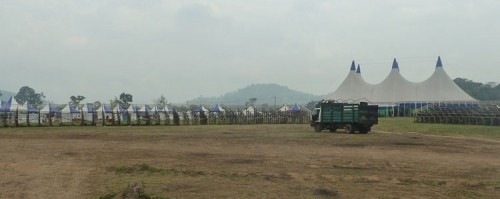 Government has published a three year plan aiming at increasing the output of more than 20 products by 2015.
Government has published a three year plan aiming at increasing the output of more than 20 products by 2015. Cameroon’s Ministry of Agriculture has granted 265 million francs CFA to the National Institute of Agricultural Research, IRAD to produce 15 tons of hybrid maize seeds by the end of this year.
Cameroon’s Ministry of Agriculture has granted 265 million francs CFA to the National Institute of Agricultural Research, IRAD to produce 15 tons of hybrid maize seeds by the end of this year. A memorandum of understanding was signed late Friday April 26, 2013 between the Minister of Water and Energy, Basile Atangana Kouna and the Chief Executive officer of Asia Pacific Wing, Anam Bin Awang in Yaoundé, according to the State owned bilingual daily,
A memorandum of understanding was signed late Friday April 26, 2013 between the Minister of Water and Energy, Basile Atangana Kouna and the Chief Executive officer of Asia Pacific Wing, Anam Bin Awang in Yaoundé, according to the State owned bilingual daily, 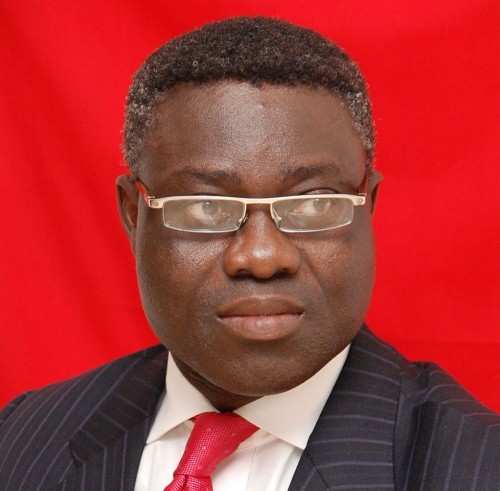 Union Bank of Africa Managing Director, Nigerian-born Phillips Oduoza has congratulated government for the enabling business environment in Cameroon. He made the statement after a courtesy visit to Prime Minister (PM), Philemon Yang at the Star Building (PM’s office) in Yaoundé last Friday April 26, 2013.
Union Bank of Africa Managing Director, Nigerian-born Phillips Oduoza has congratulated government for the enabling business environment in Cameroon. He made the statement after a courtesy visit to Prime Minister (PM), Philemon Yang at the Star Building (PM’s office) in Yaoundé last Friday April 26, 2013. Nestle-Cameroun Chief Executive, Bruno Olierhok, said the company would begin construction in August. The factory will have the capacity to grind 20,000 tons of beans, Olierhok told state radio,
Nestle-Cameroun Chief Executive, Bruno Olierhok, said the company would begin construction in August. The factory will have the capacity to grind 20,000 tons of beans, Olierhok told state radio, 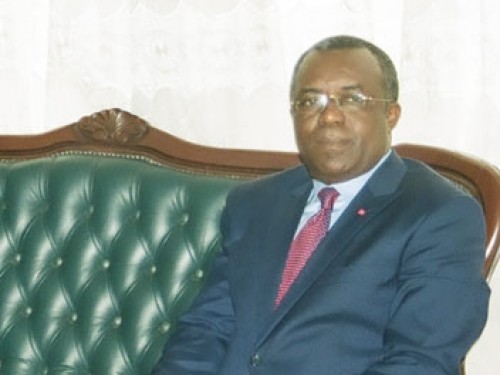 Bank of Small and Medium Size Enterprises (BC-MPE) now has a license from the constable of banking activities in the Central African Region (COBAC) to operate. Issued on Wednesday, according to
Bank of Small and Medium Size Enterprises (BC-MPE) now has a license from the constable of banking activities in the Central African Region (COBAC) to operate. Issued on Wednesday, according to 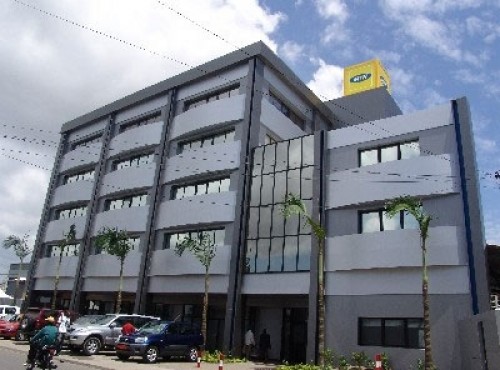 (Business in Cameroon) - Representing, a 26% jump, 1,899,820 new customers have moved towards MTN Cameroon. MTN now counts 7.307 million customers. And, the company said it expects to add another million customers in 2013. Revenues increased 8.9% last year to 236.86 billion francs CFA.
(Business in Cameroon) - Representing, a 26% jump, 1,899,820 new customers have moved towards MTN Cameroon. MTN now counts 7.307 million customers. And, the company said it expects to add another million customers in 2013. Revenues increased 8.9% last year to 236.86 billion francs CFA. “ The project for the reform of the customs service (PADMOD) will be financed to the tune of 6.5 billion francs CFA,” revealed Alexandre Tana, Director of the project last Friday in Douala. It was during the piloting committee meeting of PADMOD at the conference hall of the former directorate general of customs. To span over four years, the project is behind schedule by 13 months. Lateness is blamed on the heavy procedure, inexperience, and incompetence of the team. EU will finance the project to end in 2015 due to an additional 12 months. But, the Director General of Customs, Minette Libom Li Likeng asked the team, “to work hard and not to be discouraged.” Personals have been dropped from the project. “There have been a lot of changes at the head of the team for the project; some employees were sacked and others recruited,” Tana said. To him, “these changes helped the project to catch-up”. Despite the lateness, according to Minette Libom Li Likeng, “all the stakeholders are convinced the project will be carried out”.
“ The project for the reform of the customs service (PADMOD) will be financed to the tune of 6.5 billion francs CFA,” revealed Alexandre Tana, Director of the project last Friday in Douala. It was during the piloting committee meeting of PADMOD at the conference hall of the former directorate general of customs. To span over four years, the project is behind schedule by 13 months. Lateness is blamed on the heavy procedure, inexperience, and incompetence of the team. EU will finance the project to end in 2015 due to an additional 12 months. But, the Director General of Customs, Minette Libom Li Likeng asked the team, “to work hard and not to be discouraged.” Personals have been dropped from the project. “There have been a lot of changes at the head of the team for the project; some employees were sacked and others recruited,” Tana said. To him, “these changes helped the project to catch-up”. Despite the lateness, according to Minette Libom Li Likeng, “all the stakeholders are convinced the project will be carried out”.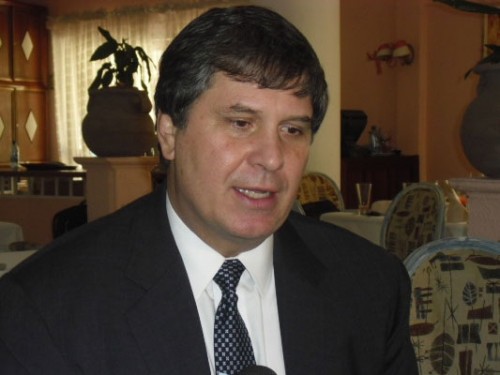 (Business in Cameroon) - In a “Special Report”,
(Business in Cameroon) - In a “Special Report”, 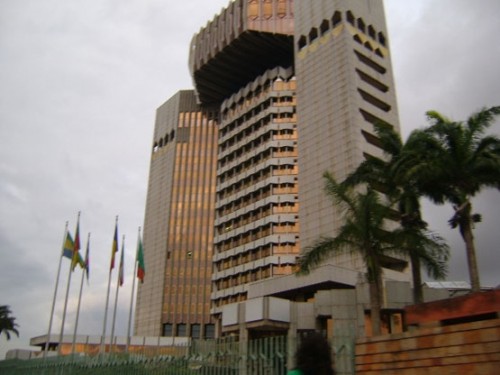 L’Etat du Cameroun a réussi à mobiliser 25 milliards de Fcfa par deux émissions de bons du Trésor, la somme de 25 milliards de Fcfa sur le marché des titres publics de la Banque de développement des Etats de l’Afrique centrale (Beac).
L’Etat du Cameroun a réussi à mobiliser 25 milliards de Fcfa par deux émissions de bons du Trésor, la somme de 25 milliards de Fcfa sur le marché des titres publics de la Banque de développement des Etats de l’Afrique centrale (Beac).  Booster la production des plants de manioc, pomme de terre, patate, maïs et de palmier à huile et, surtout, réduire le coût de ces plants au moment de les mettre à la disposition des agriculteurs. C’est l’objectif visé par le prêt de 314 millions de FCFA que la Banque africaine de développement (BAD), vient d’accorder à l’Institut de recherche agronomique pour le développement (IRAD).
Booster la production des plants de manioc, pomme de terre, patate, maïs et de palmier à huile et, surtout, réduire le coût de ces plants au moment de les mettre à la disposition des agriculteurs. C’est l’objectif visé par le prêt de 314 millions de FCFA que la Banque africaine de développement (BAD), vient d’accorder à l’Institut de recherche agronomique pour le développement (IRAD).
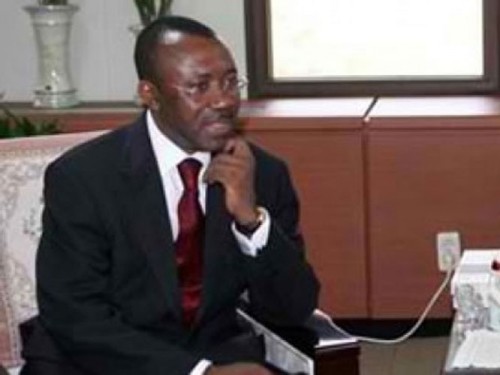 Le 15 février 2013 à Yaoundé, le Premier ministre camerounais, Philémon Yang, a présidé à l’immeuble Etoile, la cérémonie de signature d’une convention entre le gouvernement camerounais et la société G Power Cement, pour la construction d’une cimenterie d’une capacité de production de 800 000 tonnes par an, dans la ville de Limbé, région du Sud-Ouest au Cameroun. La convention a été paraphée côté camerounais par le ministre délégué aux Finances, Titi Pierre, tandis que la société G Power Cement était représentée par son directeur général, Bernd Stiehl.
Le 15 février 2013 à Yaoundé, le Premier ministre camerounais, Philémon Yang, a présidé à l’immeuble Etoile, la cérémonie de signature d’une convention entre le gouvernement camerounais et la société G Power Cement, pour la construction d’une cimenterie d’une capacité de production de 800 000 tonnes par an, dans la ville de Limbé, région du Sud-Ouest au Cameroun. La convention a été paraphée côté camerounais par le ministre délégué aux Finances, Titi Pierre, tandis que la société G Power Cement était représentée par son directeur général, Bernd Stiehl.
 Selon un communiqué rendu public par la société Camrail, concessionnaire du chemin de fer camerounais, cette entreprise mettra en service le 26 février 2013, les six locomotives acquises l’année dernière. Une cérémonie à cet effet est prévue le même jour dans les installations de la gare voyageur de Yaoundé.
Selon un communiqué rendu public par la société Camrail, concessionnaire du chemin de fer camerounais, cette entreprise mettra en service le 26 février 2013, les six locomotives acquises l’année dernière. Une cérémonie à cet effet est prévue le même jour dans les installations de la gare voyageur de Yaoundé.
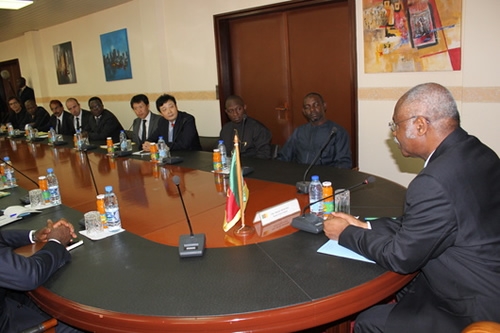 Une délégation d’investisseurs regroupés autour de la Petroleum Product Pipeline S.A. (3PL S.A.), a été reçue le 18 février 2013 à Yaoundé au Cameroun, par le Premier Ministre Philemon Yang et on présenté un projet qui devrait permettre de relier l’usine de raffinage de pétrole de Limbe (SONARA), au reste du pays, via des pipelines. Un accord semble avoir été trouvé, car selon des propos rapportés par les médias officiels, le début des travaux devrait se faire vers le dernier trimestre de l’année 2013. Le projet devrait coûter entre 200 et 300 millions de dollars, soit autour de 150 milliards de FCFA.
Une délégation d’investisseurs regroupés autour de la Petroleum Product Pipeline S.A. (3PL S.A.), a été reçue le 18 février 2013 à Yaoundé au Cameroun, par le Premier Ministre Philemon Yang et on présenté un projet qui devrait permettre de relier l’usine de raffinage de pétrole de Limbe (SONARA), au reste du pays, via des pipelines. Un accord semble avoir été trouvé, car selon des propos rapportés par les médias officiels, le début des travaux devrait se faire vers le dernier trimestre de l’année 2013. Le projet devrait coûter entre 200 et 300 millions de dollars, soit autour de 150 milliards de FCFA. Imperial Foods is a company that produces instant noodles for the African population and is part of the private sector and the US government’s effort to fight poverty, malnutrition and HIV/AIDS in Africa by introducing soy-fortified and vitamin-enriched instant noodles to the diet of Africans. Imperial Foods Company is located in the Douala free zone and has a surface of 7000 m2 and offering direct and indirect jobs to an estimated 200 number of people.
Imperial Foods is a company that produces instant noodles for the African population and is part of the private sector and the US government’s effort to fight poverty, malnutrition and HIV/AIDS in Africa by introducing soy-fortified and vitamin-enriched instant noodles to the diet of Africans. Imperial Foods Company is located in the Douala free zone and has a surface of 7000 m2 and offering direct and indirect jobs to an estimated 200 number of people. REPUBLIC OF CAMEROON PEACE - WORK - FATHERLAND LAW N° 98 / 014 OF 14 JUIL. l998
REPUBLIC OF CAMEROON PEACE - WORK - FATHERLAND LAW N° 98 / 014 OF 14 JUIL. l998